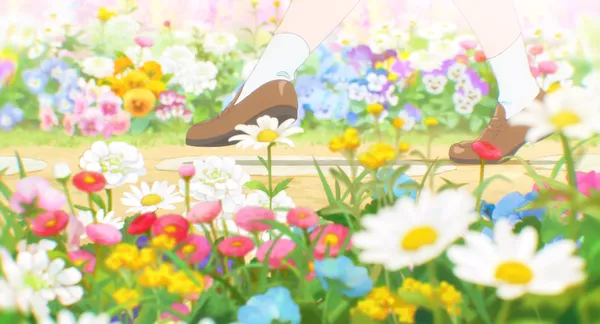Eye For Film >> Movies >> The Colors Within (2024) Film Review
The Colors Within
Reviewed by: Jennie Kermode

There’s a tendency amongst some adults to panic at the idea of young children being educated about things like relationships and sexual orientation, because in their own imaginations they associate these things with sexual acts. Perhaps that’s understandable in a capitalist culture which makes most things sexual, and Japanese animation certainly bears a share of responsibility for that. In reality, however, sexual feelings usually don’t develop until some time after the other sensations which complicate friendship and steer young minds towards romance. Intense crushes may or may not predict future behaviour, but they can be every bit as meaningful.
Written and directed by women, The Colors Within is a wistful exploration of those pre-sexual or proto-sexual feelings which, being so little talked about, have a compelling aspect of mystery. Schoolgirl Totsuko (voiced by Suzukawa Sayo) doesn’t know why she finds herself overwhelmed in the presence of Kimi (Takaishi Akari), and she has no model through which to make sense of it. She knows only that she wants to gaze at her all the time; and that, when Kimi abruptly drops out, her life feels meaningless. Fortunately the two are able to reconnect, in the process also befriending a boy who suggests that they all three start a band together, and so begins another chapter of life.

It all unfolds in the gentlest, most innocent way. Totsuko is a good Christian girl, and even the crush she has one one on the nuns who is among her teachers seems to produce nothing but a sense of divine gratitude. The nun acts a guide, prompting her to become a little bolder in ger engagement with the world, to recognise her own agency. Thus inspired, she begins to write heavily derivative Christian rock. She finds freedom in dance. When she and Kimi enjoy a few unguarded hours together, they laugh lightly, draw spirographs, eat snacks and paint each other’s nails.
All this wholesomeness might sound cloying and unnatural, but director Yamada Naoko handles it with supreme confidence. It feels natural and very real. It’s supported by the animation, which is loose and flowing, reflecting an increasing tendency towards experimentation in Japanese film. It suits the characters who are not yet fully formed – Totsuko least of all. Again, there is nothing sexual about them. The camera focuses on aspects of their faces and bodies that are more important from a child’s perspective, and this is very effective on drawing viewers back into the atmosphere of a school, as lived rather than imagined – the reality of girlhood with its clumsiness both physical and emotional.
The film’s central conceit – and the reason for its title – is that Totsuko can, as Westerners would put it, see auras. She seems to have a form of synaesthesia in which her emotional reactions to particular individuals are experienced as colour, and of course viewers get to share in this. The young nun is associated with gold, everything around her suffused with golden light. Kimi’s colours are shifting blues, shades beloved by Monet and Dali, collecting like little watercolour splashes, fading and reforming. There is no particular thesis attached to this – it’s just another of life’s mysteries – but it keeps older viewers from smugly imagining that they have it all figured out, and it gives Totsuko a secret language of her own.
A cleverly realised take on life at a delicate age, The Colors Within is sentimental but never feels forced. It’s a brave attempt to do something different, and for some younger viewers it seems likely to become a lifelong favourite.
Reviewed on: 30 Jan 2025















